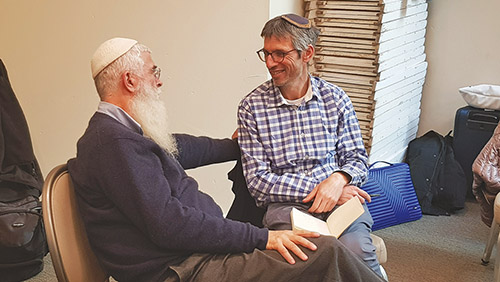



By Ronit Mershon
Last week, over 80 Jewish education leaders from around the country came together for a winter seminar hosted by Lifnai V’lifnim. In partnership with Jewish Education Innovation Challenge (JEIC), Lifnai V’lifnim is a Mayberg Foundation educational initiative “that works to catalyze radical improvement in Jewish day schools.
The theme of the seminar was Cultivating a Culture of Avodat Hashem in Schools; Growing as Individuals, as a Faculty, and as a School Community. Held at Congregation Keter Torah in Teaneck, it was attended by representatives from several area schools including Ma’ayanot Yeshiva High School for Girls and Rae Kushner Yeshiva High School.
Educators gathered together to discuss some of the biggest questions facing Jewish schools. Sessions highlighted the efficacy of holistic teaching, exploration of reflective learning, individual growth among other novel approaches meant to foster a life-long pursuit of religious growth.
Originally developed for Yeshivat Makor Chaim in Israel by Rabbi Dov Singer and his son, Rav Yishai Singer, the program was first instituted in the United States at Fuchs Mizrachi School in Cleveland, Ohio, by Rabbi Yehuda Chanales, who was director of curriculum at the time.
Senior Adviser for Education Grants and Programs at the Mayberg Foundation Rachel Abrahams explained that the aim is to make Judaic studies more personalized, relevant and meaningful so that students really come away from their day school experience with the desire to continue learning and to continue integrating Judaism into their lives, even once they are out of school.
She added, “Rav Dov Singer and Rav Yishai Singer feel strongly that without a different lens on what classroom and school is supposed to be about, it’s very difficult to actually deepen students’ relationship to Judaism and God.”
Rabbi Chanales, Lifnai V’lifnim’s director of education and Judaic faculty member at Ma’ayanot, calls it an approach where “to some extent it’s about creating certain structures and certain types of spaces in school for faculty and for students.” But a certain mindset is required as well—one that is willing “to slow down and to be more reflective and to see that not as a waste of time but as something that can energize and change the dynamics and the relationships and the learning the rest of the week.”
Rabbi Shmuel Feld, founding director of JEIC, said, “Jewish Education Innovation Challenge began supporting Lifnai V’Lfnim as part of a school grant in 2017-19 called the Teacher Torah Collaboratory. As part of the grant, the high school staff at Fuchs Mizrachi School studied Lifnai V’Lfnim in Israel with the originators of the pedagogy. Since seeing Lifnai V’Lfnim’s success, JEIC supported the scaling of this amazing idea to other Jewish day schools that wish to see their students flourish. We feel privileged to be part of the journey.” JEIC catalyzes radical improvement in Jewish day schools, challenging them to achieve their mandate of optimizing student internalization of Jewish wisdom, identity and decision making, according to their website.
Rav Dov Singer sees this program as a way to impact students’ experiences of Torah learning and tefillah by helping to facilitate the development of relationship skills, self-awareness, trust and authentic dialogue for both educators and students.
When Rav Dov Singer first visited Rabbi Chanales at the Fuchs School, he referred to the people there as “luzer-im,” which is the Hebrew abbreviation of “luach zmanim” and translates to “schedules.” His observation was that the school’s culture was almost entirely driven by bells, schedules and timing.
“Students are challenged to be in so many different places at once throughout their day in school…there is so much that we expect from students…and there is very little time to be.” Rav Singer emphasizes the difference between la’asot and l’hiyot—to do versus to be. He says that “being is really critical for growth and really critical to internalize anything, any values, any messages.” The same, he said, can be said for teachers, who also run from class to class, to home, only to then spend time preparing new lessons, tests and assessments. All this only adds tremendous pressure on them.
However, he had an approach as to how to change that and create spaces within the school that have a different feeling. “He has a very different vision for what a school culture can look like and how to develop a culture of continual religious growth and learning.”
“We are interested in fostering that kind of environment in schools. We know that teachers are much more than conveyors of information. They serve as role models. They serve as relationship builders…and that’s an important part of fostering Jewish identities and connections.”
For instance, at Rae Kushner Yeshiva High School, juniors and seniors enjoy a weekly period, called “Hadracha,” that has been dedicated to implement this methodology where “students report finding real meaning in the experience,” according to Norma Mintz, Tanach teacher at RKYHS.
“One of the most exciting things in this work is to see the energy that teachers get when they are given the space to think differently and to ask themselves different kinds of questions,” she said. “There’s a certain kind of renewed sense of energy and excitement about what they believe is really the core of their teaching, which is the relationships with the students and the ability to make the Torah and the learning personal and connected.”
She continued, “Especially after the past couple of years and the challenges of COVID there was a lot of talk around the country about burnout. Part of what we see that is so incredible about this work is that it allows teachers to stay in touch with their passion, their sense of idealism, their connection to students and avoid some of the general burnout that others are facing.”
To learn more about Lifnai V’Lifnim contact ychanales@gmail.com or visit www.jewishchallenge.org.










